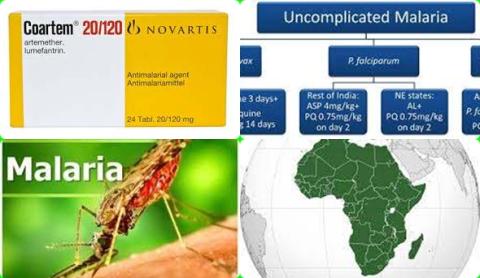
Objectives:
Africa still bears the largest burden of malaria as the majority of infections in the continent are caused by P. falciparum. Artemether-lumefantrine (AL, Coartem®) is the most widely used artemisinin-based combination therapy (ACT), for treating uncomplicated falciparum malaria globally. However, the development of resistance to antimalarial drugs is a major challenge for malaria control. Therefore, this review article has been conducted.
What is the efficacy of Artemether-lumefantrine ((AL, Coartem®) for the treatment of uncomplicated falciparum malaria in Africa?
Study design:
This review article included 39 articles that reported the treatment outcome of 8,320 patients.
The number of participants in each included study varied from 33 to 595.
Majority of the included articles 31 (79.5%) measured the efficacy of AL in terms of ACPR at day 28, while in the remaining studies at 7 (17.9%) and 1 (2.7%), the follow-up period was 42 and 63 days, respectively.
Most 31 (79.5%) of the studies included patients who were older than 6 months, while in the remaining studies at 7 (17.9%) included all age groups and 1 (2.6%) include only pregnant women.
Among the total 8,320 study subjects, males were dominant (>50%). At enrollment, the mean age, weight, body temperature and the hemoglobin level were ranged from 1.9 to 31.9 years, 8.7 to 40.3 kilograms, 38.1 to 39°C and 8.7 to 12.5 g/dL, respectively.
At enrollment, gametocytes were found in 2.1% to 13.9% of the study participants.
Similarly, the average parasite count (the geometric parasite density, GMPD) per patient was between 7,898 and 65,299 in a microliter of blood.
Parasite density (parasite/μL of whole blood) was estimated using the following formula; “number of parasites counted”/“WBC counted” multiplied with “total WBC count/μL”.
Results and conclusions:
The investigators found after 28 days of follow-up, the pooled PCR uncorrected and corrected APCR was at 87% [95% CI = 85 to 90%] and 97.0% [95% CI = 96 to 98%], respectively.
The investigators found, moreover, the proportion of early treatment failure (ETF) was almost 0%, while most of the included articles reported 8% late treatment failures.
The investigators found the reinfection and recrudescence rate was less than 10% and 2.6%, respectively, within 28 days.
The investigators found rapid fever and parasite clearance in which greater than 93% and 94% patients were parasite and fever free at day three following AL treatment.
The investigators concluded Coartem® remains effective and thus could continue to be the drug of choice for the treatment of uncomplicated falciparum malaria for all age groups in Africa. However, the risk of new emerging resistance for this combination warrants regular monitoring of its efficacy across the continent.
Original title:
Therapeutic Efficacy of Artemether-Lumefantrine (Coartem®) for the Treatment of Uncomplicated Falciparum Malaria in Africa: A Systematic Review by Derbie A, Mekonnen D, […], Abebe T.
Link:
https://www.ncbi.nlm.nih.gov/pmc/articles/PMC7599419/
Additional information of El Mondo:
Find more information/studies on malaria and malnutrition right here.